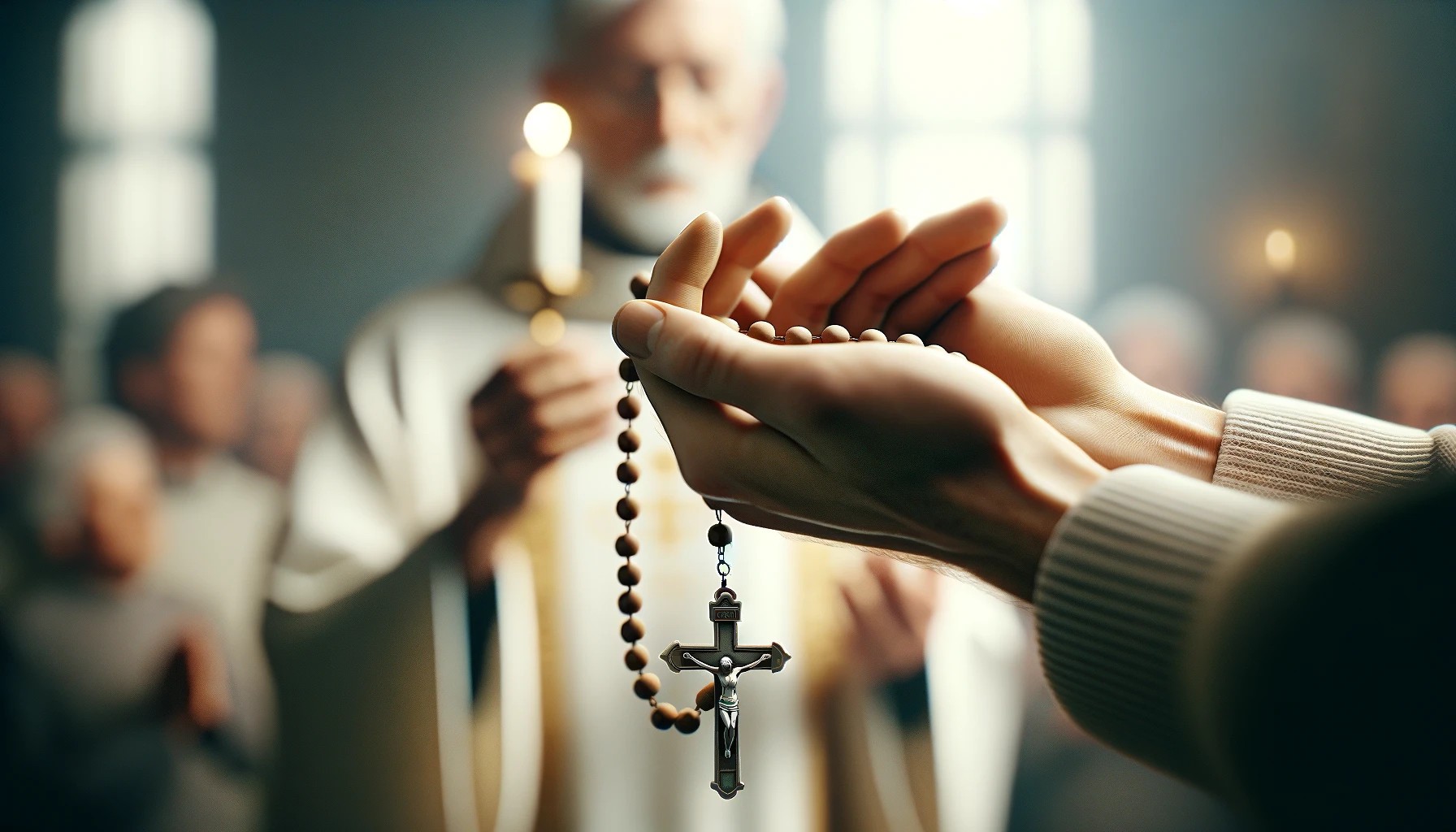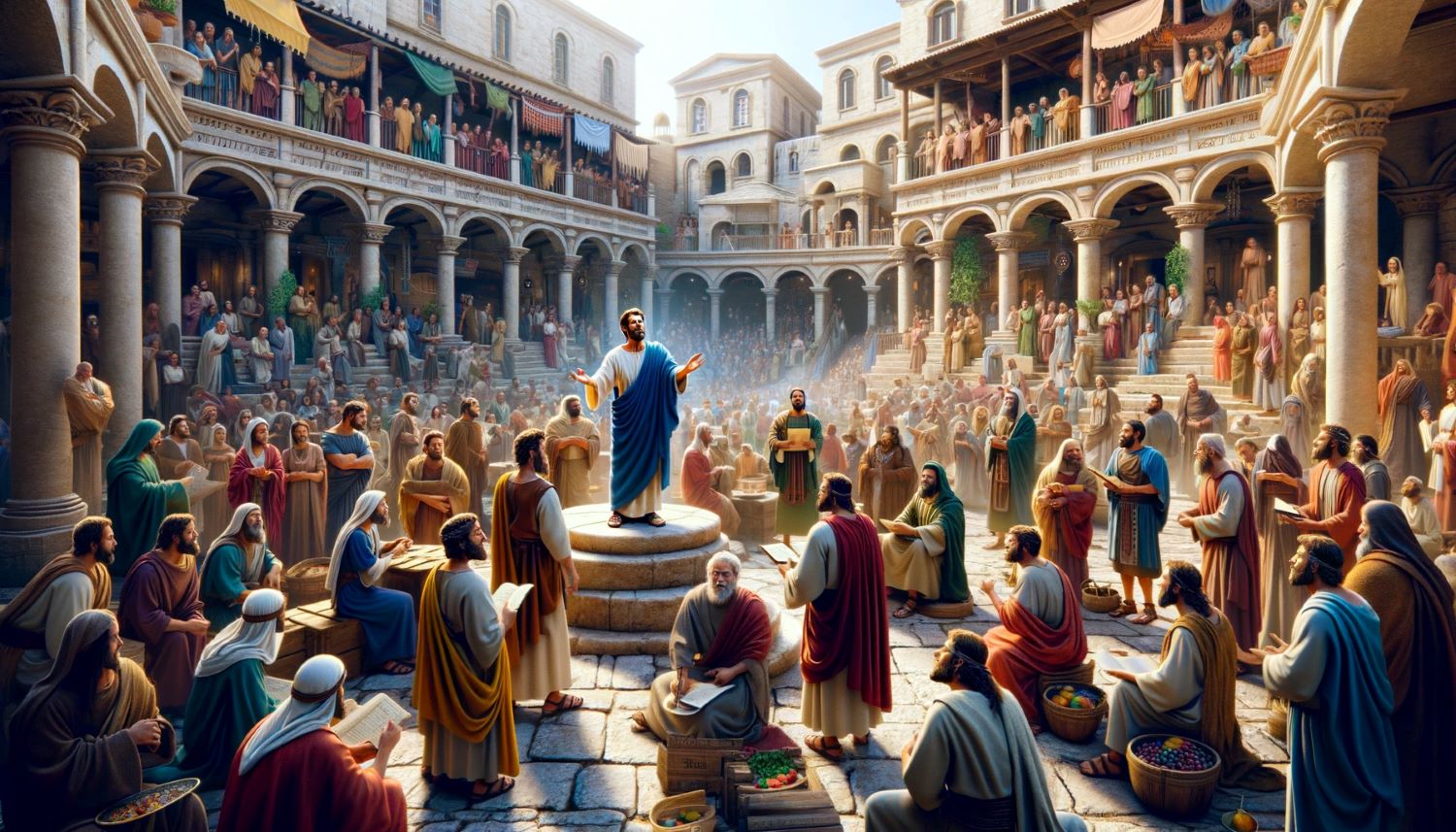Home>Bible Facts>What Did The Apostles Do After They Received The Holy Spirit?


Bible Facts
What Did The Apostles Do After They Received The Holy Spirit?
Published: February 22, 2024
Jason DeRose, Managing Editor at Christian.net, uses his expertise in religion and journalism to deepen understanding of faith's societal impacts. His editorial leadership, coupled with a strong academic background, enriches the platform’s diverse content, earning him recognition in both journalism and religious circles.
Discover the fascinating post-Pentecost activities of the apostles in the Bible. Learn about their impactful actions after receiving the Holy Spirit. Explore more Bible facts now!
(Many of the links in this article redirect to a specific reviewed product. Your purchase of these products through affiliate links helps to generate commission for Christian.net, at no extra cost. Learn more)
Table of Contents
Introduction
After receiving the Holy Spirit, the apostles embarked on a transformative journey that reshaped the course of history. Their experiences, actions, and unwavering faith laid the foundation for the early Christian church and set in motion a movement that continues to impact the world today. This pivotal moment, known as Pentecost, marked the outpouring of the Holy Spirit upon the apostles, empowering them to fulfill the commission given by Jesus before His ascension. The events following this divine encounter are a testament to the apostles' unwavering dedication, resilience, and unwavering commitment to spreading the Gospel message to all nations.
The outpouring of the Holy Spirit ignited a fervent zeal within the apostles, propelling them to step out boldly and fearlessly proclaim the teachings of Jesus Christ. Their actions were not confined to the walls of the upper room where they had gathered; instead, they ventured into the streets, speaking in diverse languages, and miraculously communicating with people from various regions. This supernatural manifestation captivated the attention of multitudes, laying the groundwork for the apostles' impactful ministry.
As we delve into the remarkable journey of the apostles following the reception of the Holy Spirit, we will witness their unwavering commitment to fulfilling the Great Commission, the formation of the early Christian church, the manifestation of miracles and healings, as well as the challenges and persecution they encountered. The apostles' post-Pentecost endeavors serve as an enduring testament to the transformative power of faith, unity, and divine empowerment, inspiring believers across generations to embrace their calling with boldness and conviction.
The subsequent sections of this article will delve into the apostles' mission to spread the Gospel, the formation of the early church, the manifestation of miracles and healings, as well as the challenges of persecution and martyrdom they faced. Through this exploration, we will gain profound insights into the unwavering dedication and profound impact of the apostles as they navigated the uncharted territories of spreading the message of hope, redemption, and salvation to a world in dire need of divine intervention.
The Apostles' Mission to Spread the Gospel
Following the outpouring of the Holy Spirit at Pentecost, the apostles were emboldened to embark on an extraordinary mission: to spread the Gospel message to the ends of the earth. Empowered by the divine presence of the Holy Spirit, they fervently embraced their calling as heralds of the Good News, venturing into diverse regions with unwavering determination and zeal.
The apostles' mission was characterized by a profound sense of urgency and purpose. They recognized the transformative power of the Gospel and the eternal significance of sharing it with humanity. With resolute conviction, they traversed cities and villages, proclaiming the teachings of Jesus Christ with eloquence and boldness. Their unwavering commitment to this mission was fueled by a deep sense of compassion for the lost and a fervent desire to see lives transformed by the message of salvation.
As they journeyed from place to place, the apostles encountered diverse cultures, languages, and belief systems. Despite these challenges, they remained undaunted, relying on the guidance of the Holy Spirit to effectively communicate the Gospel to people from all walks of life. Their message transcended barriers, resonating with the hearts of both the humble and the influential, the learned and the uneducated.
The apostles' mission was not confined to mere words; it was accompanied by tangible demonstrations of God's power and love. Miracles, signs, and wonders followed their ministry, serving as compelling testimonies to the authenticity of the Gospel message they proclaimed. Through these supernatural manifestations, the apostles affirmed the authority and sovereignty of Jesus Christ, drawing multitudes to witness the transformative impact of His teachings.
Their unwavering commitment to the mission of spreading the Gospel was not without peril. They encountered opposition, persecution, and adversity at every turn. Yet, in the face of daunting challenges, they stood firm, exemplifying unwavering faith and resilience. Their steadfast resolve to fulfill their divine mandate inspired countless individuals to embrace the message of hope and redemption, igniting a flame of faith that continues to illuminate the world.
In essence, the apostles' mission to spread the Gospel stands as a testament to the enduring power of faith, courage, and divine empowerment. Their unwavering dedication and sacrificial commitment laid the groundwork for the global expansion of the Christian faith, leaving an indelible legacy that continues to inspire believers to embrace their calling with fervor and conviction.
The Formation of the Early Church
The outpouring of the Holy Spirit at Pentecost not only ignited the apostles' fervor for spreading the Gospel but also catalyzed the formation of the early Christian church. This pivotal moment marked the birth of a vibrant community of believers who were united in their devotion to the teachings of Jesus Christ and the fellowship of the Holy Spirit.
The early church was characterized by a profound sense of unity, mutual support, and unwavering commitment to the apostles' teachings. Acts 2:42-47 provides a vivid depiction of the early church's dynamic ethos, emphasizing their devotion to the apostles' doctrine, fellowship, breaking of bread, and prayer. This vibrant community of believers shared a deep sense of camaraderie, actively engaging in acts of compassion, generosity, and communal worship.
Central to the formation of the early church was the apostles' role as spiritual leaders and shepherds. They provided foundational teachings, spiritual guidance, and pastoral care, nurturing the burgeoning community of believers and equipping them for a life of faith and discipleship. Through their unwavering commitment to nurturing and edifying the early church, the apostles laid the groundwork for a legacy of spiritual growth, unity, and communal strength.
The early church also exemplified a remarkable spirit of inclusivity, transcending cultural, social, and ethnic boundaries. This diverse community welcomed individuals from various backgrounds, fostering a climate of acceptance, equality, and shared purpose. The apostles' teachings emphasized the universal scope of God's redemptive plan, inspiring the early church to embrace a spirit of inclusivity and hospitality.
Furthermore, the early church was characterized by a fervent commitment to prayer and worship. Acts 2:46-47 portrays their dedication to communal gatherings, where they fervently worshipped, broke bread together, and partook in the Lord's Supper. These gatherings served as a catalyst for spiritual renewal, communal bonding, and the cultivation of a vibrant worship culture that permeated every facet of their lives.
In essence, the formation of the early church stands as a testament to the transformative impact of the apostles' ministry and the outpouring of the Holy Spirit. Their unwavering commitment to nurturing a vibrant community of believers, fostering unity, inclusivity, and spiritual growth, laid the foundation for a global movement that continues to resonate with believers across generations. The early church's legacy of faith, fellowship, and communal devotion serves as an enduring model for contemporary Christian communities, inspiring them to emulate the spirit of unity, compassion, and unwavering devotion that characterized the early church.
Miracles and Healings
The apostles, empowered by the Holy Spirit, were conduits of divine power, manifesting miracles and healings that astounded multitudes and affirmed the authenticity of their message. These extraordinary manifestations of God's power served as compelling testimonies to the transformative impact of the Gospel and solidified the apostles' authority as heralds of the Good News.
The apostles' ministry was punctuated by miraculous interventions that defied natural laws and captivated the hearts of onlookers. Acts 3 recounts the remarkable healing of a man who had been lame from birth. Through the name of Jesus Christ, the apostles bestowed upon him the gift of mobility, eliciting awe and wonder among the witnesses. This miraculous healing not only restored the man's physical well-being but also served as a powerful demonstration of the redemptive power of Christ.
Similarly, Acts 5 narrates accounts of the apostles performing extraordinary signs and wonders among the people, drawing the sick and afflicted to them. The mere passing of Peter's shadow over the sick resulted in their miraculous healing, underscoring the pervasive nature of God's healing power through the apostles.
The apostles' ministry of miracles and healings extended beyond physical restoration; it encompassed deliverance from spiritual bondage and oppression. Acts 16 recounts the deliverance of a demon-possessed girl through the apostles' authoritative command in the name of Jesus Christ. This profound act of spiritual liberation not only freed the girl from bondage but also bore witness to the apostles' divine commission to proclaim freedom and redemption in Christ.
These miraculous interventions were not confined to a specific demographic or locale; they transcended cultural and social barriers, resonating with individuals from diverse backgrounds. The apostles' unwavering faith and reliance on the Holy Spirit propelled them to perform extraordinary feats that bore witness to the transformative power of the Gospel.
The apostles' ministry of miracles and healings stands as a testament to the enduring impact of divine intervention and the unwavering faith of those called to proclaim the Gospel. Their extraordinary manifestations of God's power served as compelling testimonies to the authenticity of their message, drawing multitudes to embrace the teachings of Jesus Christ. The legacy of miracles and healings left by the apostles continues to inspire believers to fervently seek God's transformative power and to boldly proclaim the redemptive message of the Gospel to a world in need of divine intervention.
Persecution and Martyrdom
The apostles' unwavering commitment to spreading the Gospel and their unyielding faith in the teachings of Jesus Christ often brought them face to face with persecution and martyrdom. Their bold proclamation of the Good News and their refusal to compromise their beliefs in the face of opposition made them targets of intense hostility and persecution.
The book of Acts vividly portrays the apostles' encounters with persecution as they fearlessly proclaimed the message of salvation. Acts 4 recounts the apostles' arrest and subsequent interrogation by the religious authorities due to their bold preaching in the name of Jesus. Despite facing threats and intimidation, the apostles remained resolute in their dedication to spreading the Gospel, refusing to be silenced by the forces of opposition.
The persecution of the apostles escalated with the martyrdom of Stephen, a devout follower of Christ and a powerful proclaimer of the Gospel. His unwavering faith and fearless testimony led to his stoning at the hands of those who vehemently opposed the message he proclaimed. Stephen's martyrdom marked the beginning of a wave of persecution that targeted early believers, including the apostles, as they continued to boldly declare the transformative message of Jesus Christ.
The apostle James, the brother of John, became a prominent figure among the early martyrs. His steadfast commitment to the Gospel and his unwavering faith in the face of adversity led to his unjust execution at the hands of King Herod Agrippa. James' martyrdom served as a poignant reminder of the immense sacrifices made by the apostles in their unwavering dedication to fulfilling their divine commission.
The apostle Peter also faced severe persecution for his steadfast proclamation of the Gospel. His imprisonment and subsequent miraculous deliverance, as recorded in Acts 12, exemplify the intense opposition and threats that the apostles encountered as they fearlessly advanced the Kingdom of God. Despite the looming specter of persecution, the apostles remained undaunted, steadfastly embracing their calling with unwavering resolve and courage.
The apostles' experiences of persecution and martyrdom stand as a testament to their unshakable faith, unwavering commitment, and sacrificial devotion to spreading the Gospel. Their willingness to endure persecution and even martyrdom for the sake of the Gospel serves as an enduring example of steadfast faith and unwavering dedication. Their legacy of resilience in the face of persecution continues to inspire believers to stand firm in their faith and boldly proclaim the message of salvation, regardless of the challenges and opposition they may encounter.
The apostles' unwavering commitment to spreading the Gospel and their unyielding faith in the teachings of Jesus Christ often brought them face to face with persecution and martyrdom. Their bold proclamation of the Good News and their refusal to compromise their beliefs in the face of opposition made them targets of intense hostility and persecution.
The book of Acts vividly portrays the apostles' encounters with persecution as they fearlessly proclaimed the message of salvation. Acts 4 recounts the apostles' arrest and subsequent interrogation by the religious authorities due to their bold preaching in the name of Jesus. Despite facing threats and intimidation, the apostles remained resolute in their dedication to spreading the Gospel, refusing to be silenced by the forces of opposition.
The persecution of the apostles escalated with the martyrdom of Stephen, a devout follower of Christ and a powerful proclaimer of the Gospel. His unwavering faith and fearless testimony led to his stoning at the hands of those who vehemently opposed the message he proclaimed. Stephen's martyrdom marked the beginning of a wave of persecution that targeted early believers, including the apostles, as they continued to boldly declare the transformative message of Jesus Christ.
The apostle James, the brother of John, became a prominent figure among the early martyrs. His steadfast commitment to the Gospel and his unwavering faith in the face of adversity led to his unjust execution at the hands of King Herod Agrippa. James' martyrdom served as a poignant reminder of the immense sacrifices made by the apostles in their unwavering dedication to fulfilling their divine commission.
The apostle Peter also faced severe persecution for his steadfast proclamation of the Gospel. His imprisonment and subsequent miraculous deliverance, as recorded in Acts 12, exemplify the intense opposition and threats that the apostles encountered as they fearlessly advanced the Kingdom of God. Despite the looming specter of persecution, the apostles remained undaunted, steadfastly embracing their calling with unwavering resolve and courage.
The apostles' experiences of persecution and martyrdom stand as a testament to their unshakable faith, unwavering commitment, and sacrificial devotion to spreading the Gospel. Their willingness to endure persecution and even martyrdom for the sake of the Gospel serves as an enduring example of steadfast faith and unwavering dedication. Their legacy of resilience in the face of persecution continues to inspire believers to stand firm in their faith and boldly proclaim the message of salvation, regardless of the challenges and opposition they may encounter.
Conclusion
The post-Pentecost journey of the apostles stands as a testament to their unwavering commitment, resilience, and profound impact on the early Christian church. Empowered by the outpouring of the Holy Spirit, the apostles embarked on a transformative mission to spread the Gospel to the ends of the earth. Their fervent zeal, unwavering faith, and miraculous manifestations of God's power laid the foundation for the global expansion of the Christian faith.
The apostles' mission to spread the Gospel transcended geographical, cultural, and linguistic barriers, resonating with individuals from diverse backgrounds. Their unwavering dedication to proclaiming the teachings of Jesus Christ, accompanied by tangible demonstrations of God's power, drew multitudes to embrace the message of salvation. The apostles' ministry of miracles and healings served as compelling testimonies to the transformative impact of the Gospel, affirming the authenticity of their divine commission.
Furthermore, the formation of the early church under the apostles' guidance exemplified a spirit of unity, inclusivity, and fervent devotion to the teachings of Jesus Christ. The vibrant community of believers nurtured by the apostles became a beacon of hope and spiritual strength, inspiring future generations to emulate their unwavering commitment to faith and fellowship.
Despite facing intense persecution and martyrdom, the apostles remained steadfast in their dedication to spreading the Gospel, refusing to be silenced by the forces of opposition. Their willingness to endure persecution and even martyrdom for the sake of the Gospel serves as an enduring example of steadfast faith and unwavering dedication.
The apostles' post-Pentecost endeavors continue to inspire believers across generations to embrace their calling with boldness and conviction, to nurture vibrant communities of faith, and to fearlessly proclaim the transformative message of the Gospel. Their legacy of unwavering commitment, resilience in the face of adversity, and profound impact on the early Christian church serves as a timeless testament to the enduring power of faith, unity, and divine empowerment.














